 For the second straight year between the conference championships and the Super Bowl, Tom Brady has announced his retirement from the NFL. This time, however, he says it is for good. As a Boston fan, Tom Brady forever changed my sports landscape. He brought the region its first championship since 1986, against a team that was supposed to destroy the Patriots. Over his 20 years in New England, Brady delivered 6 Super Bowl Championships (but it should have been 9) and the belief that the Patriots always stood a chance. The Boston sports landscape shifted after that first Super Bowl and became the city of champions, with 12 total championships (6 by the Patriots, 4 by the Red Sox, and 1 each by the Celtics and Bruins). Assuming this really is the end of the road for Brady, it was certainly a great ride for football fans. And now on to this week’s logistics news.
For the second straight year between the conference championships and the Super Bowl, Tom Brady has announced his retirement from the NFL. This time, however, he says it is for good. As a Boston fan, Tom Brady forever changed my sports landscape. He brought the region its first championship since 1986, against a team that was supposed to destroy the Patriots. Over his 20 years in New England, Brady delivered 6 Super Bowl Championships (but it should have been 9) and the belief that the Patriots always stood a chance. The Boston sports landscape shifted after that first Super Bowl and became the city of champions, with 12 total championships (6 by the Patriots, 4 by the Red Sox, and 1 each by the Celtics and Bruins). Assuming this really is the end of the road for Brady, it was certainly a great ride for football fans. And now on to this week’s logistics news.
- Amazon in the news:
- Walmart invests in vertical farming
- Maersk deploys indoor drones for warehouse inventory counts
- UPS prepares for slowdown in global delivery volumes
- FedEx Ground creates 3-tier grading system for driver contractors
- Coca-Cola adds tethered closures to boost PET recycling in Europe
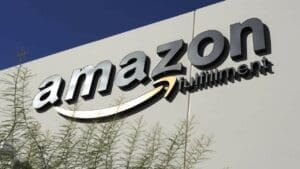 In 1955, Doc Brown was astounded to learn that he would need 1.21 GW of energy to create a reaction in the flux capacitor to send Marty McFly back to the year 1985. Fast forward to 2022, and Amazon increased its production by nearly 4-times that amount in clean energy. Earlier this week, the company announced that it grew its renewable energy capacity in 2022 by 8.3 GW through 133 new projects in 11 countries. Amazon’s total portfolio for renewables now is more than 20 GW. The company’s purchases continue to add new wind and solar projects on the grids that power operations, including Amazon Web Services (AWS) data centers, Amazon fulfillment centers, and physical stores around the world. With the continued investments, Amazon has set a new corporate record for the most renewable energy announced by a single company in one year. It remains the largest corporate buyer of renewable energy, with a plan of powering its operations with 100 percent renewable energy by 2025 – a full five years ahead of its original target.
In 1955, Doc Brown was astounded to learn that he would need 1.21 GW of energy to create a reaction in the flux capacitor to send Marty McFly back to the year 1985. Fast forward to 2022, and Amazon increased its production by nearly 4-times that amount in clean energy. Earlier this week, the company announced that it grew its renewable energy capacity in 2022 by 8.3 GW through 133 new projects in 11 countries. Amazon’s total portfolio for renewables now is more than 20 GW. The company’s purchases continue to add new wind and solar projects on the grids that power operations, including Amazon Web Services (AWS) data centers, Amazon fulfillment centers, and physical stores around the world. With the continued investments, Amazon has set a new corporate record for the most renewable energy announced by a single company in one year. It remains the largest corporate buyer of renewable energy, with a plan of powering its operations with 100 percent renewable energy by 2025 – a full five years ahead of its original target.
In other Amazon news, the company will start charging fees to online shoppers for grocery orders of less than $150, underscoring the challenging economics of getting food to shoppers’ doorsteps. The new fees, which take effect February 28, coincide with the company’s efforts to cut costs and adjust to slower growth in online shopping. Charges for the Amazon Fresh grocery delivery service in the US will be $9.95 for orders of less than $50, $6.95 for orders between $50 and $100, and $3.95 for orders of $100 to $150. Amazon had previously offered free grocery delivery for orders of more than $35 to subscribers of the company’s $139-a-year Prime program in some locations. Members can still get free delivery if their carts are more than $150. In 2021, the company eliminated a prior offer of free delivery for Whole Foods Market shoppers, tacking on a $9.95 service fee. Amazon said it is introducing a service fee on some Amazon Fresh delivery orders to help keep prices low in our online and physical grocery stores as we better cover grocery delivery costs and continue to enable offering a consistent, fast, and high-quality delivery experience.
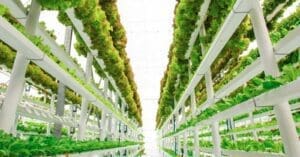 Nearly three years ago to the day, I wrote that vertical farming was going help with supply chain efficiency. Earlier this week, San Francisco-based vertical farming company Plenty Unlimited Inc. announced it had secured its largest investment to date. The startup procured $400 million in a Series E financing round, led by One Madison Group and JS Capitol, that includes Walmart and existing investing partner SoftBank Vision Fund 1 in January 2022. Leaders from Walmart and One Madison Group will join Plenty’s board of directors, and the $400 million in funds will propel Plenty’s growth, which includes using its technology platform to sell multicrop farms directly to its business partners. In addition to financing, Plenty has signed a commercial agreement with Walmart to “lead a new category of fresh products and bring Plenty farms closer to Walmart customers to offer pesticide-free, sustainable produce year round,” according to the release. The partnership will kick off by first sourcing Walmart’s California stores with Plenty’s leafy greens from its Compton farm.
Nearly three years ago to the day, I wrote that vertical farming was going help with supply chain efficiency. Earlier this week, San Francisco-based vertical farming company Plenty Unlimited Inc. announced it had secured its largest investment to date. The startup procured $400 million in a Series E financing round, led by One Madison Group and JS Capitol, that includes Walmart and existing investing partner SoftBank Vision Fund 1 in January 2022. Leaders from Walmart and One Madison Group will join Plenty’s board of directors, and the $400 million in funds will propel Plenty’s growth, which includes using its technology platform to sell multicrop farms directly to its business partners. In addition to financing, Plenty has signed a commercial agreement with Walmart to “lead a new category of fresh products and bring Plenty farms closer to Walmart customers to offer pesticide-free, sustainable produce year round,” according to the release. The partnership will kick off by first sourcing Walmart’s California stores with Plenty’s leafy greens from its Compton farm.
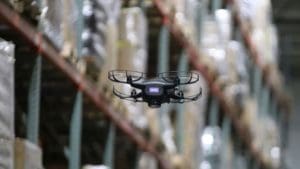 Maritime containership giant A.P. Moller – Maersk is turning to flying drones to manage inventory counts in its warehouse network, the Danish firm said. New Jersey-based Maersk North America will deploy the battery-powered flying cameras to handle the “difficult, repetitive, and tedious” task of warehouse inventory management, which is says requires workers to work at heights and produces a quality of data that is often questioned. As an alternative, Maersk has contracted with Switzerland’s Verity, a nine-year-old startup firm that says its autonomous drones cruise the warehouse on nights or weekends, navigating from pallet to pallet to collect data “like bees collecting pollen to make honey at the hive.” Verity’s system then delivers that information to the client’s existing warehouse management system (WMS) software product. Details on the number of drones deployed or the value of the deal were not disclosed. However, the company said the project started six months ago and currently includes drones operating at four sites, according to Maersk spokesman Thomas Boyd. Maersk’s deployment plan for 2023 is to install drones in all its warehouses that have pallet storage, he said.
Maritime containership giant A.P. Moller – Maersk is turning to flying drones to manage inventory counts in its warehouse network, the Danish firm said. New Jersey-based Maersk North America will deploy the battery-powered flying cameras to handle the “difficult, repetitive, and tedious” task of warehouse inventory management, which is says requires workers to work at heights and produces a quality of data that is often questioned. As an alternative, Maersk has contracted with Switzerland’s Verity, a nine-year-old startup firm that says its autonomous drones cruise the warehouse on nights or weekends, navigating from pallet to pallet to collect data “like bees collecting pollen to make honey at the hive.” Verity’s system then delivers that information to the client’s existing warehouse management system (WMS) software product. Details on the number of drones deployed or the value of the deal were not disclosed. However, the company said the project started six months ago and currently includes drones operating at four sites, according to Maersk spokesman Thomas Boyd. Maersk’s deployment plan for 2023 is to install drones in all its warehouses that have pallet storage, he said.
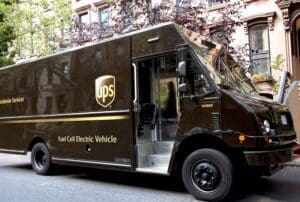 UPS is preparing for a slowdown in global delivery volumes as it advised that annual revenue could decline for the first time since 2009. The Atlanta-based delivery company said Tuesday that it expects revenue of between $97 billion and $99.4 billion in 2023, down from $100.3 billion last year. The outlook comes after the company posted a surprise decline in fourth-quarter revenue after delivering fewer items during the holidays than a year earlier. Softness in China trade lanes hurt the top line from international segment, the company said. Average daily package volume fell 4.5 percent in the December quarter, although revenue earned per package rose 5.2 percent. UPS executives said the company’s outlook reflects an expectation for the U.S. to face a mild recession in the first half of the year before a recovery in the second half. Trade growth worldwide is expected to slow this year as import demand weakens across major economies and several developing countries face debt shocks and food insecurity, according to the World Trade Organization’s forecast in October.
UPS is preparing for a slowdown in global delivery volumes as it advised that annual revenue could decline for the first time since 2009. The Atlanta-based delivery company said Tuesday that it expects revenue of between $97 billion and $99.4 billion in 2023, down from $100.3 billion last year. The outlook comes after the company posted a surprise decline in fourth-quarter revenue after delivering fewer items during the holidays than a year earlier. Softness in China trade lanes hurt the top line from international segment, the company said. Average daily package volume fell 4.5 percent in the December quarter, although revenue earned per package rose 5.2 percent. UPS executives said the company’s outlook reflects an expectation for the U.S. to face a mild recession in the first half of the year before a recovery in the second half. Trade growth worldwide is expected to slow this year as import demand weakens across major economies and several developing countries face debt shocks and food insecurity, according to the World Trade Organization’s forecast in October.
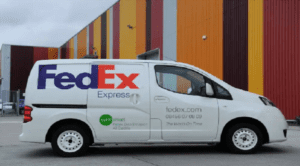 FedEx Ground is putting its pickup and delivery contractors through an extensive performance-grading process that could result in some contractors losing their exclusive rights to bid on and negotiate contracts to serve routes. The U.S. ground delivery unit of FedEx has established three performance levels: gold, silver and bronze. Contractors who receive a “bronze” grade, which is the lowest level and in the company’s view reflects poor efficiency, poor customer service or both, will lose their once-exclusive right to negotiate for their routes and will be subject to open bidding for them. This means that those contractors can lose their routes if the company believes that another bidder has submitted a superior price-value proposition. Those who are graded as “silver” will effectively be treated neutrally, with no punishments or rewards. It is unclear what rewards “gold” contractors will receive.
FedEx Ground is putting its pickup and delivery contractors through an extensive performance-grading process that could result in some contractors losing their exclusive rights to bid on and negotiate contracts to serve routes. The U.S. ground delivery unit of FedEx has established three performance levels: gold, silver and bronze. Contractors who receive a “bronze” grade, which is the lowest level and in the company’s view reflects poor efficiency, poor customer service or both, will lose their once-exclusive right to negotiate for their routes and will be subject to open bidding for them. This means that those contractors can lose their routes if the company believes that another bidder has submitted a superior price-value proposition. Those who are graded as “silver” will effectively be treated neutrally, with no punishments or rewards. It is unclear what rewards “gold” contractors will receive.
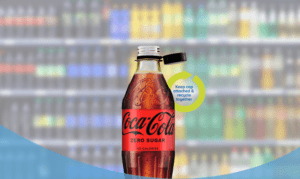 Starting in July 2024, all plastic bottles up to three liters in size will be required by EU law to have closures that remain attached to the container for the duration of their intended use. Coca-Cola is ahead of the ruling by a full 18 months, as it is rolling out tethered caps on its bottles today. The ruling by the EU is to promote more recycling. Coca-Cola’s packaging solution will cut down on waste by ensuring that the cap is recycled with the bottle. The new packaging also aligns with Coca-Cola’s long-term plans as it wants to make 100 percent of its packaging recyclable by 2025. To date, 400 million closures have been applied to Coca-Cola’s bottling lines, and the rollout will continue to all of the company’s European plants.
Starting in July 2024, all plastic bottles up to three liters in size will be required by EU law to have closures that remain attached to the container for the duration of their intended use. Coca-Cola is ahead of the ruling by a full 18 months, as it is rolling out tethered caps on its bottles today. The ruling by the EU is to promote more recycling. Coca-Cola’s packaging solution will cut down on waste by ensuring that the cap is recycled with the bottle. The new packaging also aligns with Coca-Cola’s long-term plans as it wants to make 100 percent of its packaging recyclable by 2025. To date, 400 million closures have been applied to Coca-Cola’s bottling lines, and the rollout will continue to all of the company’s European plants.
That’s all for this week. Enjoy the weekend and the song of the week, It’s So Hard to Say Goodbye by Boyz II Men.

















